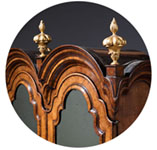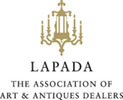Signed Mid 19th C. Edo/Meiji Period Diminutive Lacquer Stacking Cabinet, Japan
£5,800
Follow Us
Signed Mid 19th C. Edo/Meiji Period Diminutive Lacquer Stacking Cabinet, Japan
The highly decorated tray in the form of a table frames a series of three stacking boxes, a further three lidded boxes and a tray concealed within, raised on ogee bracket feet.
This fine lacquer stacking cabinet of gold and black is a variation on a cabinet for incense. It contains small boxes within boxes to hold incense woods and an outer tray in the form of a table with legs.
All of the original eleven components are present.
The opening up of Japan in the mid-1850s after more than two centuries of seclusion from the rest of the world triggered a huge interest in Japanese art and design. Western collectors, artists and designers particularly admired lacquer, for which they had no equivalent.
Further reading: (see last image in gallery)
This stacking cabinet relates closely to an example purchased by the Victoria & Albert Museum at the Paris Exhibition of 1867 (accession number: 875 to J-1869). This and subsequent international exhibitions were largely responsible for introducing Japanese art to the Western public. Lacquerwork formed a central part of the Japanese displays at these exhibitions. Some examples were old, but the majority, like this piece, were new or nearly new. The V&A acquired 20 items of Japanese lacquer work from the Paris Exhibition.
It is plausible that this item was purchased at the Paris Exhibition in 1867.
Condition
Good. Wear consistent with age and use. Good original condition with minor wear in line with age and use.
Dimensions
Height: 12.4 cm (4.89 in)
Width: 13 cm (5.12 in)
Depth: 8.9 cm (3.51 in)
Provenance
Private collection Salisbury
PREVIOUSLY SOLD
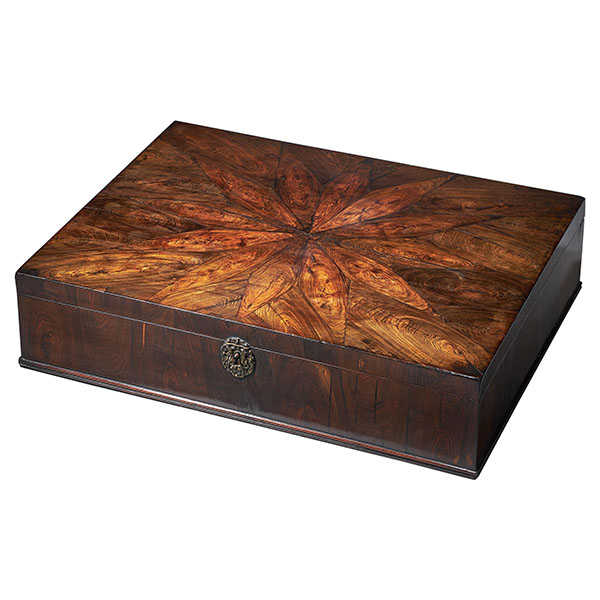
17th Century Charles II Cocuswood Lace Box, Circa 1660, England
17th Century Charles II Cocuswood Lace Box, Circa 1660, England SoldFollow Us17th Century Charles II Cocuswood Lace Box, Circa 1660, England An extremely rare and important Cocuswood oyster (Brya ebenus) lace box from the reign of Charles II,...
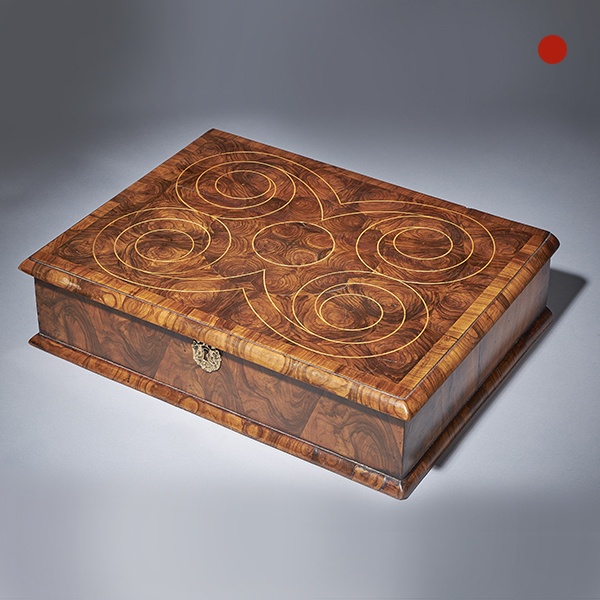
A superb 17th-century olive oyster lace box from the reign of King Charles II, circa 1675-85.
A superb 17th century olive oyster lace box from the reign of King Charles II, circa 1675-85. Geometric patterns adorn the selected and book-matched hand cut olive oysters to the top which is beautifully inlaid with fine boxwood stringing, cross-banded and edged with cross grain mouldings, all in figured olive.
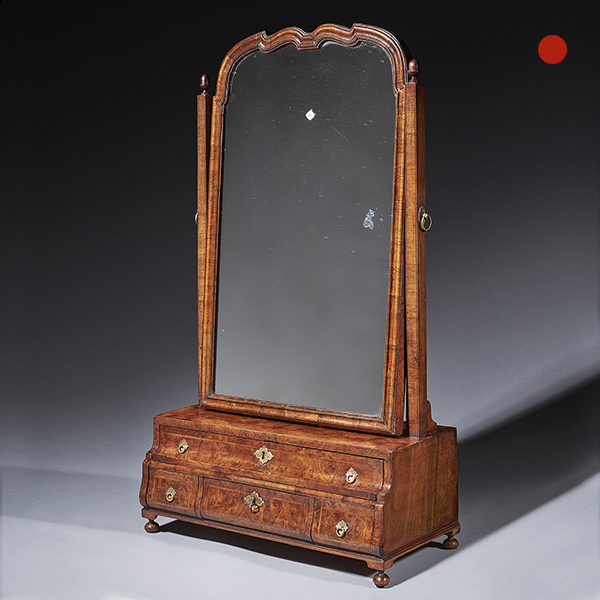
A fine burr walnut George I dressing mirror. Circa 1715-25 England.
A fine burr walnut George I dressing mirror Circa 1715-25 England. SoldFollow UsA fine burr walnut George I antique dressing mirror An extremely rare and fine George I burr walnut dressing mirror raised on ball and bracket feet. The drawer...
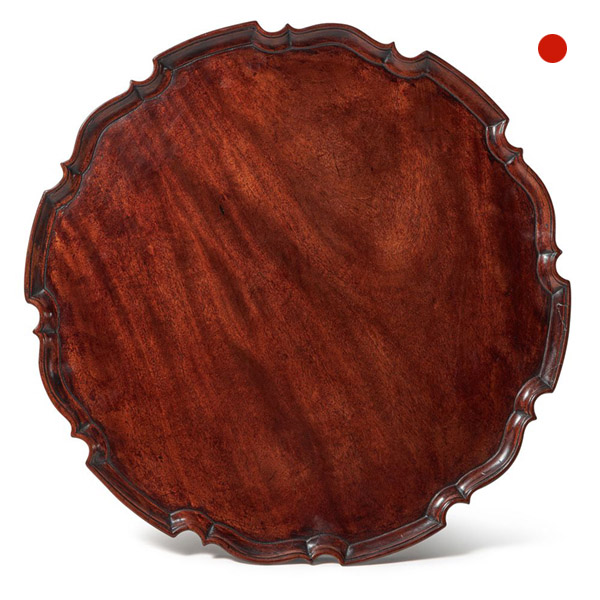
George III Chippendale Period Mahogany Pie Crust Tray
A fine George III Chippendale period mahogany pie crust tray, circa 1770, England. Of circular form, with a carved and shaped edge. Alexander George Fine Antique sell 18th & 19th century antique English furniture.
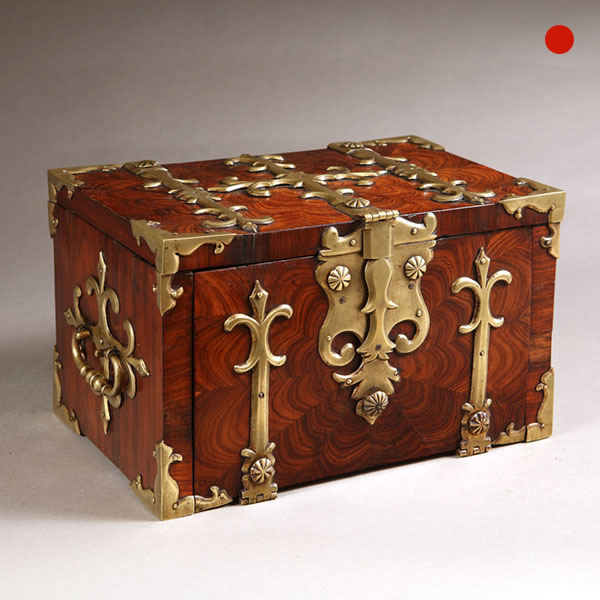
17th Century William and Mary Kingwood Strongbox
A 17th century William and Mary Kingwood strongbox, with gilt brass straps. This strongbox has to be one of the most charming and certainly the smallest example we have encountered, at just 17.5 cm high, 28 cm wide and 18 cm deep. A strongbox of similar merit form and style resides at Burghley House in ‘The 1st George State Room.
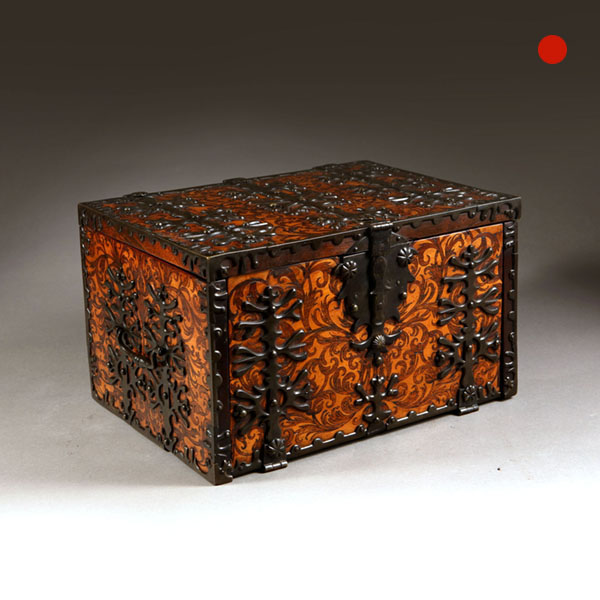
William and Mary Seaweed Marquetry Strong Box Firmly Attributed to Gerrit Jensen
A 17th century William and Mary seaweed or arabesque marquetry strong box, with firm attribution to the royal cabinetmaker, Gerrit Jensen, circa 1680-1700, England.

17th Century Charles II Cocuswood Lace Box, Circa 1660, England
17th Century Charles II Cocuswood Lace Box, Circa 1660, England SoldFollow Us17th Century Charles II Cocuswood Lace Box, Circa 1660, England An extremely rare and important Cocuswood oyster (Brya ebenus) lace box from the reign of Charles II,...

A superb 17th-century olive oyster lace box from the reign of King Charles II, circa 1675-85.
A superb 17th century olive oyster lace box from the reign of King Charles II, circa 1675-85. Geometric patterns adorn the selected and book-matched hand cut olive oysters to the top which is beautifully inlaid with fine boxwood stringing, cross-banded and edged with cross grain mouldings, all in figured olive.

A fine burr walnut George I dressing mirror. Circa 1715-25 England.
A fine burr walnut George I dressing mirror Circa 1715-25 England. SoldFollow UsA fine burr walnut George I antique dressing mirror An extremely rare and fine George I burr walnut dressing mirror raised on ball and bracket feet. The drawer...

George III Chippendale Period Mahogany Pie Crust Tray
A fine George III Chippendale period mahogany pie crust tray, circa 1770, England. Of circular form, with a carved and shaped edge. Alexander George Fine Antique sell 18th & 19th century antique English furniture.

17th Century William and Mary Kingwood Strongbox
A 17th century William and Mary Kingwood strongbox, with gilt brass straps. This strongbox has to be one of the most charming and certainly the smallest example we have encountered, at just 17.5 cm high, 28 cm wide and 18 cm deep. A strongbox of similar merit form and style resides at Burghley House in ‘The 1st George State Room.

William and Mary Seaweed Marquetry Strong Box Firmly Attributed to Gerrit Jensen
A 17th century William and Mary seaweed or arabesque marquetry strong box, with firm attribution to the royal cabinetmaker, Gerrit Jensen, circa 1680-1700, England.
YOU MAY ALSO LIKE
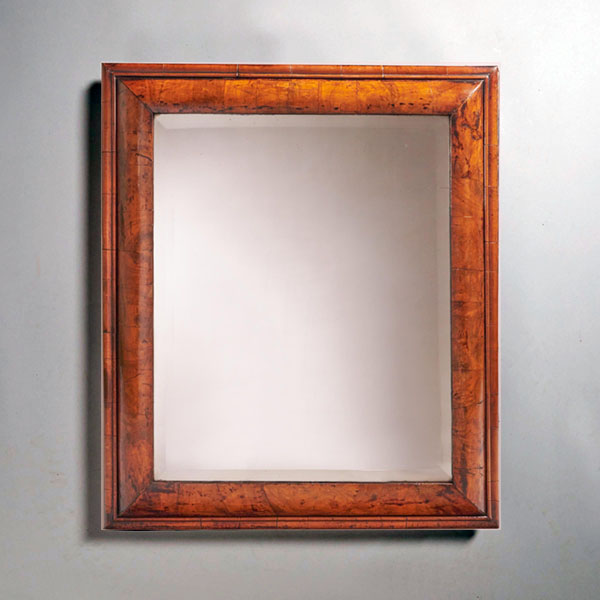
A Fine William and Mary 17th Century Figured Walnut Cushion Mirror C, 1690
A Fine William and Mary 17th Century Figured Walnut Cushion Mirror C, 1690 £6,500Follow UsA Fine William and Mary 17th Century Figured Walnut Cushion Mirror C, 1690 A large William and Mary 17th century figured walnut cushion mirror, circa...
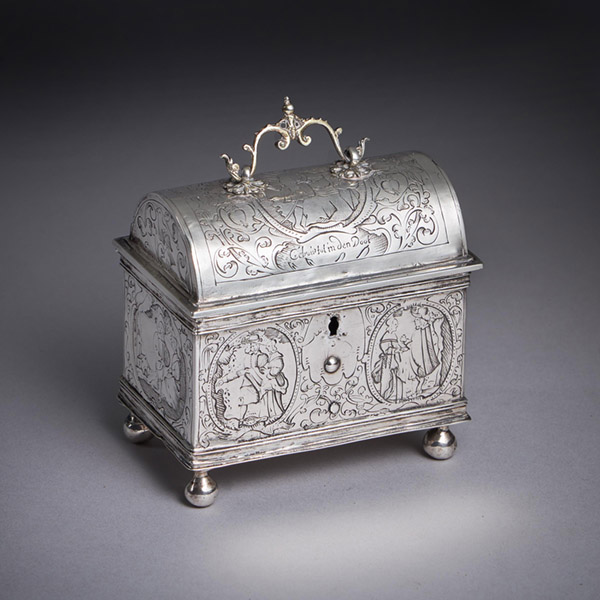
A museum-grade mid-17th century Dutch silver marriage casket or knottekistje, circa 1660
A museum-grade mid-17th century Dutch silver marriage casket or knottekistje, circa 1660 £9,500 [wpforms_selector form_id="11387" show_title="on" _builder_version="4.22.1" _module_preset="default" custom_margin="-30px||||false|false"...
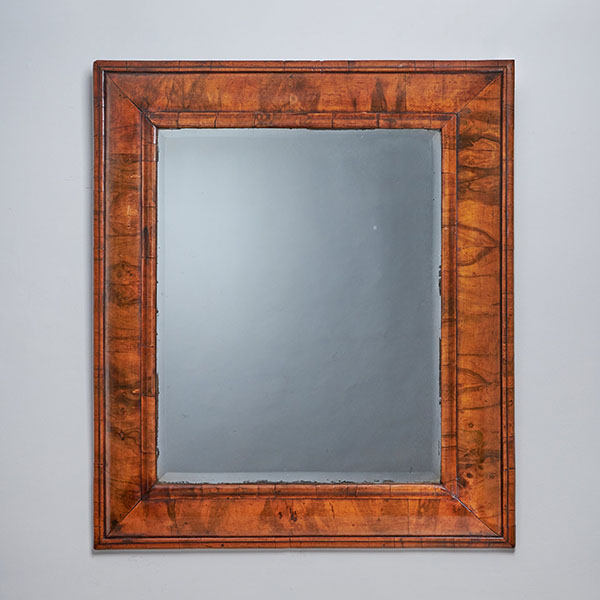
Large William and Mary 17th Century Figured Walnut Cushion Mirror c, 1690
Large William and Mary 17th Century Figured Walnut Cushion Mirror c, 1690 £7,495[wpforms_selector form_id="11387" show_title="on" _builder_version="4.22.1" _module_preset="default" custom_margin="-30px||||false|false" global_colors_info="{}"...
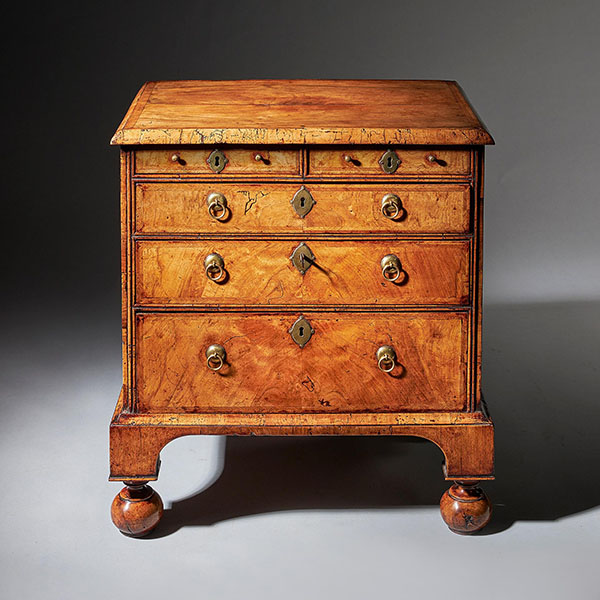
An extremely rare George I walnut chest of small proportions on ball and bracket
An extremely rare George I walnut chest of small proportions on ball and bracket £18,800[wpforms_selector form_id="11387" show_title="on" _builder_version="4.22.1" _module_preset="default" custom_margin="-30px||||false|false"...
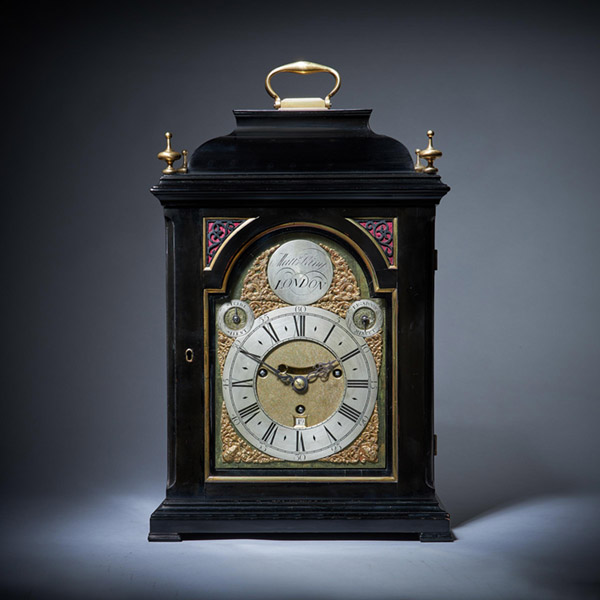
A Rare 18th Century George II Musical Table Clock by Matthew King, c. 1735.
A Rare 18th Century George II Musical Table Clock by Matthew King, c. 1735. £24,500[wpforms_selector form_id="11387" show_title="on" _builder_version="4.22.1" _module_preset="default" custom_margin="-30px||||false|false"...
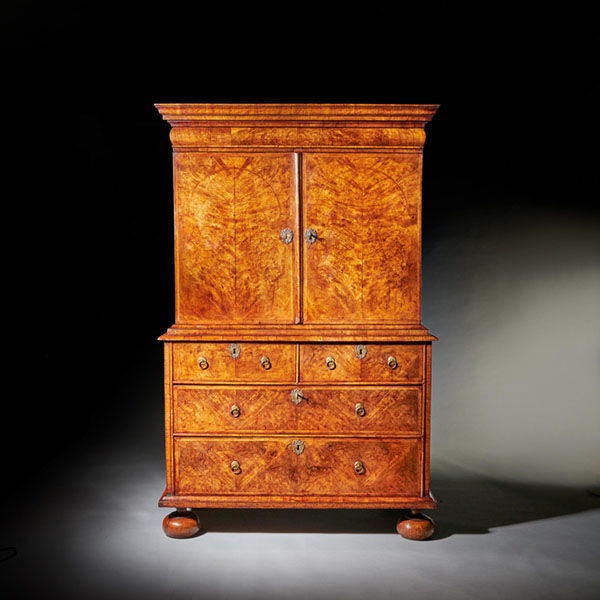
A Fine 17th Century William and Mary Burl Walnut Cabinet on Chest, Circa 1690
A Fine 17th Century William and Mary Burl Walnut Cabinet on Chest, Circa 1690 £27,800[wpforms_selector form_id="11387" show_title="on" _builder_version="4.22.1" _module_preset="default" custom_margin="-30px||||false|false"...

A Fine William and Mary 17th Century Figured Walnut Cushion Mirror C, 1690
A Fine William and Mary 17th Century Figured Walnut Cushion Mirror C, 1690 £6,500Follow UsA Fine William and Mary 17th Century Figured Walnut Cushion Mirror C, 1690 A large William and Mary 17th century figured walnut cushion mirror, circa...

A museum-grade mid-17th century Dutch silver marriage casket or knottekistje, circa 1660
A museum-grade mid-17th century Dutch silver marriage casket or knottekistje, circa 1660 £9,500 [wpforms_selector form_id="11387" show_title="on" _builder_version="4.22.1" _module_preset="default" custom_margin="-30px||||false|false"...

Large William and Mary 17th Century Figured Walnut Cushion Mirror c, 1690
Large William and Mary 17th Century Figured Walnut Cushion Mirror c, 1690 £7,495[wpforms_selector form_id="11387" show_title="on" _builder_version="4.22.1" _module_preset="default" custom_margin="-30px||||false|false" global_colors_info="{}"...

An extremely rare George I walnut chest of small proportions on ball and bracket
An extremely rare George I walnut chest of small proportions on ball and bracket £18,800[wpforms_selector form_id="11387" show_title="on" _builder_version="4.22.1" _module_preset="default" custom_margin="-30px||||false|false"...

A Rare 18th Century George II Musical Table Clock by Matthew King, c. 1735.
A Rare 18th Century George II Musical Table Clock by Matthew King, c. 1735. £24,500[wpforms_selector form_id="11387" show_title="on" _builder_version="4.22.1" _module_preset="default" custom_margin="-30px||||false|false"...

A Fine 17th Century William and Mary Burl Walnut Cabinet on Chest, Circa 1690
A Fine 17th Century William and Mary Burl Walnut Cabinet on Chest, Circa 1690 £27,800[wpforms_selector form_id="11387" show_title="on" _builder_version="4.22.1" _module_preset="default" custom_margin="-30px||||false|false"...
